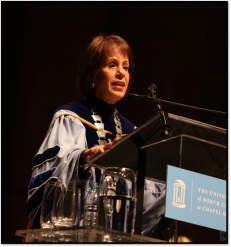Related Posts
Change at the speed of innovation
I really appreciated Chancellor Folt’s University Day messages about the future. They align with many of the directions we have been taking for the Gillings School. Chancellor Folt said that “to push our innovation capacity and global boundaries, we have to embrace and manage for change that is taking place faster than ever before—change needs to occur at the speed of innovation.”
We are so grateful that the gift from Dennis and Joan Gillings in 2008 gave us the means to invest in Gillings Innovation Laboratories (GILs), which are intended to spur high-risk and potentially high-reward activities aimed at solving some of public health’s greatest threats and challenges. If we are to establish a lasting foundation for creative thought, innovation must be endorsed and facilitated actively by campus leaders, funded by the university and generous donors and enabled by deans, chairs and others. In our case, we also have found it extremely important to provide innovation accelerators, including Don Holzworth, MS, our executive in residence, and Julie MacMillan, MPH, managing director, Research and Innovation Solutions. It takes faculty and staff members and students who are ready to expose their bold ideas to critique and development, to work tirelessly to assess proof of concept and then to develop their ideas further, if warranted. Innovations may be sparked in spite of the prevalent milieu, but we are trying to create a fertile environment and ecosystem that make innovation more likely.
We also are paying attention to the other end of the innovation spectrum—implementation. Hundreds of years of examples show that even if something really great is discovered, it may languish a long time before it is disseminated widely. Our implementation efforts are robust and growing.
A fertile innovation ecosystem
The innovation ecosystem at Carolina includes many people, places and programs that support students and faculty members in ways that allow imaginations and ideas to soar while providing coaching and mentorship that multiply the chances of success. Highlights of that ecosystem include Judith Cone and the innovation roadmap, Buck Goldstein and the entrepreneurship minor (which this year involves more than 370 students focused on the campus’ Food for All theme) and BeAM (“Be a Maker”) makerspaces, including the newest one, in the Hanes Art Center, co-led by Glenn Walters, PhD, director of our School’s environmental sciences and engineering Design Center. I’m proud that we are the first, or one of the very first, schools of public health to offer an entrepreneurship minor, thanks to Alice Ammerman, DrPH, professor of nutrition and director of the Center for Health Promotion and Disease Prevention. The public health entrepreneurship track is one of seven available at UNC-Chapel Hill.
[ra_grid_content key=”sph_page_grids” grid_id=”sph_page_grids_1″]
For people in public health, the goal of innovation is to solve problems—big problems that kill and injure people, reduce quality of life, siphon public dollars and undermine communities. As Carol Folt said, we need to do all this faster. Barbara

